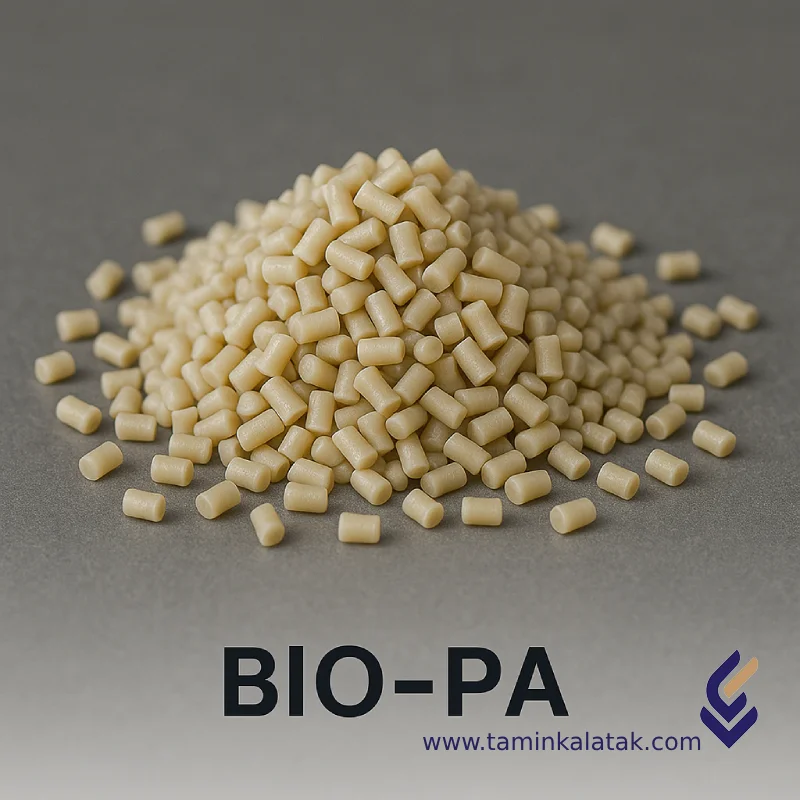Polymers are made up of very large molecules made up of many repeating units called monomers, which ultimately form this long polymer chain
Biobased PolyAmide (Bio-PA)
Bio-Based Polyamides are a class of engineering polymers derived from renewable resources such as castor oil, starch, or plant-based fats. These polyamides serve as more sustainable alternatives to conventional petroleum-based polyamides (such as PA6 and PA66) due to their lower environmental impact, high mechanical and thermal stability, and growing adoption across various industries.
Structure of Bio-Based Polyamides
The chemical structure of bio-based polyamides is very similar to that of conventional petroleum-derived polyamides, with the main difference being that their monomer units are obtained from renewable sources.
For example:
-
Polyamide 11 (PA11) is derived from castor oil.
-
Polyamide 610 (PA610) is produced from natural palmitic acid.
Structural Characteristics:
-
Contain repeating amide groups (-CONH-) in the polymer backbone
-
Produced via condensation polymerization
-
Possess longer molecular chains for improved flexibility and mechanical strength
Key Properties of Bio-Based Polyamides
-
High thermal resistance
-
Mechanical properties comparable to conventional polyamides
-
Lower moisture absorption compared to PA66
-
Recyclable and environmentally friendly
-
Excellent chemical resistance to oils and solvents
-
Low friction coefficient, ideal for moving or mechanical components
Applications of Bio-Based Polyamides
✅ Automotive industry: fuel lines, connectors, fasteners
✅ Electronics and home appliances
✅ Sportswear and high-performance footwear
✅ Heat- and moisture-resistant packaging
✅ Industrial and mechanical equipment requiring durability and stability
Disadvantages of Bio-Based Polyamides
-
Higher cost compared to traditional polyamides
-
Limited availability of bio-based raw materials
-
More complex production processes, requiring specialized equipment
-
In some cases, additives are needed to optimize final properties
Advantages of Bio-Based Polyamides
✅ Reduced dependence on fossil-based resources
✅ Lower carbon footprint and contribution to sustainable development
✅ High technical performance comparable to petroleum-based polyamides
✅ Structural versatility for a wide range of industrial applications
✅ Compatibility with injection molding, extrusion, and blow molding processes
Applications
| Applications | , , , |
|---|
Biobased PolyAmide (Bio-PA)
| Products | Grid | Melt Flow Index (MFI) (g/10 min) | Density (g/mm³) | Process method | Applications |
|---|---|---|---|---|---|
| Polyamide 11 (PA11) | Rilsan® BMNO | 25,00 | 103,00 | Injection, extrusion | Fuel pipes, industrial coatings, automotive components, athletic shoes |
| Polyamide 610 (PA610) | Zytel® 610 | 42,00 | 108,00 | Injection molding | Chemical resistant parts, electrical connectors, kitchen appliances |
| Polyamide 1010 | BioPA 1010 | 3,00 | 105,00 | Blow molding, extrusion | Durable packaging containers, biofilms, consumer equipment |
| Polyamide 410 | EcoPa 410 | 5,00 | 109,00 | Extrusion, molding | Lightweight industrial parts, precision instruments, recyclable medical equipment |







